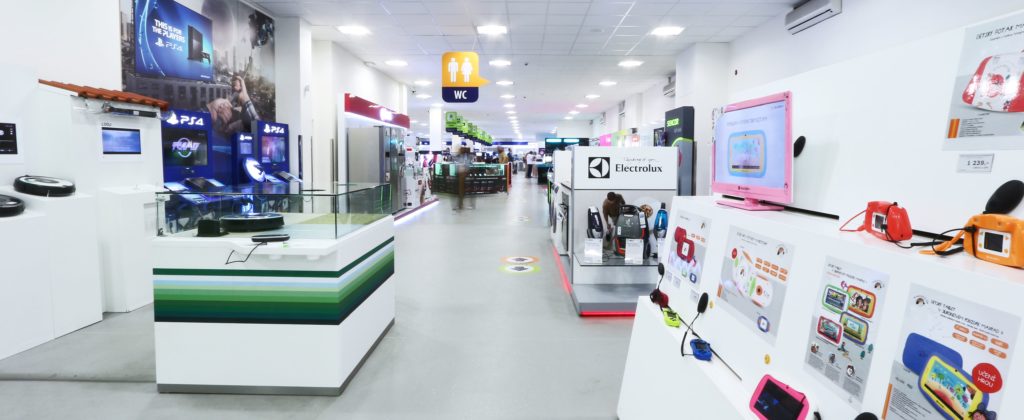
The secret sauce that’s supercharging retail stores
The success of any retail store comes down to its simplicity. No matter where in the world you may be, walk into any store and you’ll somehow manage to navigate your way around to find what you’re looking for.
The retail industry relies on the movement of goods, which makes the planning, promoting and selling of products in a short period of time challenging. From managing suppliers and running an efficient supply chain, retailers have to constantly adjust in order to meet changing customer needs. With ever-growing options for when, where and how consumers buy goods, retailers have to get increasingly creative and competitive.
With e-commerce sales up by 8.6% in Europe since 2018, online players are stepping up the pressure on margins and threatening to take consumers away from ‘brick and mortar’ stores. To combat this, traditional retailers are moving beyond legacy IT infrastructure and adopting technologies such as artificial intelligence (AI) to win the hearts and minds of consumers.

The data basics
RAHAT Market, Azerbaijan’s leading shopping chain has revamped its traditional stores. Competing against international brands as well as the more traditional outdoor Bazaars, the Baku-headquartered company wanted to better deliver on its core promise to provide high-quality customer service and products at affordable prices.
In order to realise the benefits of AI, RAHAT Market first had to upgrade from its aging on-premise infrastructure, which didn’t adequately protect organizational data or provide reliable data backup and recovery. By migrating to the cloud, RAHAT Market not only addressed this short-term problem but also started to reap strategic value from a new virtual way of running its business.
“We no longer have to buy any server equipment, and we actually need fewer resources in the cloud, so our costs have gone down to as little as $1 a day for each store,” said Turab Huseynov, IT Manager at RAHAT Market. “What’s more, system uptime has improved by 100%, which means our IT resources spend less time doing maintenance and more time providing value to our customers. We’re excited about the potential AI could have on our business, but for us, the crucial first step was getting our data house in order.”
 Innovating to create the store of tomorrow
Innovating to create the store of tomorrow
Already having a strong data foundation, Żabka, Poland’s largest chain of convenience stores is using AI to take convenience to the next level with its vision for the ‘store of tomorrow’.
With more than 5,600 stores, Żabka is developing a number of AI-powered solutions including price analysis systems, digital signage, smart shelves and self-service checkouts with video verification. When these solutions roll-out, Żabka’s 2.2 million customers will no longer have to scan products at the point of payment.
Additionally, smart shelves will be able to inform customers about product prices, sell-by dates, and suggestions on what to buy. Connected mobile applications will make the shopping experiences faster for consumers, while at the same time providing Żabka with detailed analysis of customer trends and preferences.
But, AI goes beyond improving the shopping experience for customers. It can also help retailers improve supply chain efficiencies and optimize marketing efforts. By proactively monitoring product use-by-dates, Żabka can have a data-driven overview of product availability and expiration, which significantly reduces food wastage and costs.
Moreover, working with partners like Synerise, Żabka and other retailers can use AI to analyze online and offline data to deliver targeted and timely communication. With its comprehensive omni-channel platform, Synerise helps retailers monitor sales to identify further growth opportunities and measure results. Thanks to AI, the company can process massive amounts of data in real-time to quickly uncover and analyze individual customer behaviors, which can provide the basis of future campaigns. All of this directly impacts KPIs and promotes a customer-focused strategy informed by shopping habits and preferences across channels and platforms.
You can’t become the country’s largest e-shop without engaging your customer in good faith

Seamless experiences on the showroom floor
Taking the best ingredients from both physical retail spaces and online stores, Czech innovator and leader in e-commerce, Alza, opened a huge two-story, 5,000 square meter showroom in Budapest. Earning itself the title of the biggest e-shop in Central & Eastern Europe.
In partnership with Adastra, Alza built an ‘Experience Zone’ on its showroom floor, which uses a series of high-tech sensors, screens and cameras to accurately measure people’s changing behavior. Powered by AI and the Internet of Things, interactive screens can capture demographic data and provide personalized advertising messages in real-time; ranging from computer games for children, laptops for students to printers for photo printing.
Additionally, the solution can track walking traffic to detect the number of people visiting the Experience Zone, how long they stay, where in the area they spent the longest time and even what products they seemed most interested in. Allowing Alza to proactively engage, interact and turn visitors passing-by into paying customers – either on-site or online.
“Key to our long-term success is trust. You can’t become the country’s largest e-shop without engaging your customer in good faith,” said Jan Moudřík, Director of Expansion at Alza.cz. “What’s great about this system is that all data is anonymized so no personal information of our visitors is stored. This means we can drive bottom-line results without compromising on trust.”
In a highly competitive industry, AI can give retailers the competitive edge needed to make them stand out in a sea of online and physical retailers.














